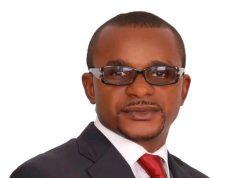2015 Presidential Election Game Changer, Ex-INEC Chairman, Attahiru Jega, Breaks Silence, Shocks APC On The Actualisation Of Biafra And Restructuring
A paper delivered by Professor Attahiru M. Jega, OFR, Department of Political Science, Bayero University, Kano, at the 5th Convocation Lecture, Nile University, University Village, Abuja.At a time when there are vociferous calls for “restructuring”, “true federalism”, “actualization of Biafra” and accompanying unconstitutional hate-inducing ultimatums; added to the already incredible challenges of bad or poor governance, as illustrated by the humongous cases of corruption and the executive-legislative imbroglio over budgetary appropriation and its implementation; it is pertinently apt to pose such questions as: “what future for Nigeria?” and what is the role of key stakeholders, such as the youth, in shaping the future? A lot of the agitations and counter agitations are being made by people who classify themselves, or a being classified as “youth”, in various groupings of dubious conceptualization. Are they, really, the youth? Who are the youth, and what should be their appropriate role for the future of our country?This lecture hopes to contribute to a clearer understanding and conceptualization of who the youth are, what are their characteristics and the nature of the challenges they face in Nigeria, what other stakeholders in the Nigerian project need to do to address the challenges; and what roles the youth should be playing to assure the prospects of a better future for Nigeria, notwithstanding the challenges, which bedevil them.Additionally, this lecture is a contribution to the on-going discourses in the context of the African Union 2017 Summit’s thematic focus titled: “Harnessing the Demographic Dividend through Investment in the Youth”. Africa is said to be contemporarily, characterized by a “Youth Bulge”, with a large majority of its population below the age of 30, or as the United Nations (UN) specifies, between the ages of 15 – 24.
This represents a huge segment or percentage of the population, which is supposed to be the most economically and politically active, but which is mostly affected by illiteracy, poverty, policy neglect and disempowerment, and therefore which has a huge potential for conflict generation and destabilization. In many different contexts globally, comparatively, this large proportion of youth relative to other segments of the population is considered to be an asset; except in Africa, and specifically in countries such as Nigeria, which is negligently converting this situation into a disturbing liability. Many theorists have averred that, a key challenge to development in Africa is converting this increasing liability back to an asset that yields dividend for stability, progress and development. I argue that it is not just in empowerment, entrepreneurship and employment that the dividend could be reaped. Crucially, in getting the youth to play greater roles in politics, policy and development processes, the dividend would yield greater rewards for societal progress and development. So, serious attention needs to be focused on youth issues, youth concerns, and especially youth’s positive engagement in all aspects of the national political economy. Allowing the youth to be disconnected, or to dissipate energy in divisive politics, or get preoccupied in criminality and self-serving pursuits, is a recipe for national disaster and spells doom for the future of any country, and especially diverse, multiethnic and multi-religious countries, such as Nigeria. The boundless energy, creativity and resourcefulness of the youth would be better channeled into productive engagements. The earlier we realize this and focus our attention on addressing the concerns and predicament of our youth, the better for the future of our country. Indeed, it is paradoxical that globally the youth are a ‘demographic majority’ and yet a ‘political minority’. Youth activism is an essential ingredient of politics. Historically, this has been so, with many concrete illustrations, which can be drawn from many countries. Yet, contemporarily, in most countries, especially so-called developing countries such as Nigeria, the role of the youth in politics has been relegated to merely being mobilized cannon fodder in the arsenal of reckless political gladiators. Educational policies fail to address their needs and aspirations. Economic policies undermine their potentials and dampen their spirits. And national development policies ignore their input, engagement and roles. It is very important that we seriously interrogate ‘Why this is so’, especially here in Nigeria; and ‘why it shouldn’t be so’! And conceptualize a more appropriate role for the youth in the construction of a better future for Nigeria, given all the current challenges. In this context, I argue that this serious matter of the neglect and disempowerment of our youth is so, because essentially, our brand of leaders seem to lack enlightened self-interest; they conflate narrow-minded short term selfish interests, with community or national interest; they are generally reckless and backward in their worldviews, and therefore seem incapable of catalyzing constructive roles for the youth. They construct an elitist narrative of being concerned with the affairs of the youth, but make no substantive effort in policies or programs to address their plight. They have failed to harness the demographic asset, which young people are, into a dividend for national development.
The so-called youth bulge, in Africa in general and in Nigeria in particular (it being the most populous country on the continent), is deliberately, or negligently being turned into a huge liability rather than a demographic dividend.But, this should not be so, because this situation subverts the potential contributions to national development of the most active segment of the population, perpetuates our underdevelopment, nurtures restiveness, vandalism and instability, as well as undermines our country’s competitiveness globally.It is imperative that we take measures urgently to empower and enable our youth to play appropriate roles in our politics in particular, and in our polity and political economy in general.In this presentation, I hope to provoke our thoughts, conscience, and souls; hopefully to add to the clarion-call for a concerted action for youth involvement and engagement and for the placement of the needs and aspirations of our youth high on the priority agenda of national policies and programs. National Progress and development is conditional on the youth playing more appropriate roles in the political economy. Nigeria neglects its youth at its own peril. The youth are our future! We must guard, protect and nurture our future.Let us first understand clearly, who are the youth, because there is a lot of misconception regarding them. A notable Nigerian political party not long ago, appointed a 60-year old person as its national youth leader! Now, that is by any definition, a mature adult, indeed virtually in the departure lounge waiting for the trip to the “far beyond”! Also, a seventy plus year old president, not long ago, defined himself as a youth, because, he said, youthfulness is in the heart! In my view, that is, to say the least, excessively patronizing. Then, if you look at all these groups, currently in the forefront of all sorts of agitations, and you examine their leaders and spoke persons who brand themselves as “youth”; technically they do not belong to that category. All these, in my view trivialize such an important matter as the youth, because, unless we properly conceptualize the youth, we would a priori weaken our capacity to understand their real concerns and address their needs and aspirations.
The United Nations Organization (UN) defines youth as young people in transition from childhood to adulthood, who fall in the age category of 15 – 24 years. The United Nations Educational Scientific and Cultural Organization (UNESCO), a specialized agency of the UN, has expanded this definition to cover all those who fall within the age category of 15 – 34 years. The African Youth Charter defines youth as young persons between the ages 15 and 35 years. So even if we stretch the definition, youth are primarily those in the age category of 15 – 35 years.Young people categorized as the youth as defined above, constitute the most vibrant, active, energetic, innovative, courageous, risk-taking, problem-solving and intellectually alert grouping of people in any country in the world. They are additionally, relatively more “ambitious, enthusiastic and promising” when they define goals and pursue them. On the other hand, paradoxically, they are more vulnerable, more impressionistic and more emotionally unstable, which suggests that they have special needs and concerns worthy of serious attention, in order not to undermine their potentials. If care is not taken, and their energies are not channeled in a positive direction, and instead they are alienated, they can also be the most rambunctious, militant, murderous, anarchic, if not criminally minded group in the population.Demographically, youth represent the majority globally. In Africa, there are presently 226 million young people out of a total population of about 1 billion, representing 20%.A vast majority of young people lives in the developing countries, notably Africa. For example, about 85% of 15 – 25 year olds live in the so-called developing countries, and is projected to rise to 89.5% by the year 2025. Of these, the UN estimates that 200 million live in poverty, 130 million are illiterate and 10 million live with HIV/AIDs. There are more women than men in the youth category, and adolescent and young women face the most daunting of challenges than any other grouping of individuals in the world: from poverty, to illiteracy, marginalization and disempowerment, reproductive and other health challenges, to debilitating diseases, such as STDs and HIV/AIDs.Thus, the youth have, arguably, the most basic needs, in terms of education, employment, emotional stability, social security and healthcare.
Regrettably, sufficient attention is not given to these; in some contexts, such as is the case in Nigeria, the neglect is simply reckless and crude. It can be argued that the greatest challenge of development relates to how to address the challenges and adequately provide for the basic needs of the youth, and channel their boundless energies into societal progress and development, rather than conflicts and criminality.History teaches us great lessons about the important and critical roles of youth in societal transformation, be it in politics, military service, religion, the economy, or in the building of empires and nations. Invariably, from all corners of the globe, change agents with tremendous impact spring up from this category of the population. This may be as a consequence of the inherent characteristics and attributes of this age group, or more importantly, as a consequence of societal socialization processes. Many societies in the past place great emphasis on character building, and the engraining of appropriate positive societal values in the indoctrination or socialization of this category of the population. Many traditional African societies for example, have rigorous age-grade initiation rituals and practices to instill values of truthfulness, courage, solidarity, selflessness, virtuousness, etc. among the youth. Along the line, some societies, and modern African nation-states have become lax in these matters of value-orientation and socialization, or indoctrination of the youth with constructive values.In any case, global comparative experiences are indicative of the fact that many transformative leaders ‘cut their teeth’ in political engagements as young men and women.
These range from the ancient military and political rulers, such as Alexander the Great, one of the most influential people in history (who succeeded his father as king of Macedon at age 20; created one of the largest empires of the ancient world, from Greece to India, at age 30); to 12th and 13th century greats, such as Genghis Khan (who was elected Khan of the Mongols at 24, became sole ruler of Mongol Empire at 35); to nineteenth century great political leaders, such as Napoleon Bonaparte (who became a general at 24 and built and ruled over a large empire in continental Europe at 35); to 20th century revolutionary types, such as Fidel Castro (27-30), Che Guevara (28-31). Others are the African greats, such as Mandela (who joined ANC at 25, became chairman of ANC Transvaal branch and organized the famous 1952 Defiance Campaign against Apartheid at 34, was subsequently jailed for 27 years, and later became elected president of South Africa in 1994); Thomas Sankara (33), Gowon (32), Murtala Mohammed (37); to early colonial and post-colonial nationalist/political activists, such as Sekou Toure (36), Mahathir Mohammed (21), Indra Ghandi (30); and other acknowledged global change agents, such as John F. Kennedy (36), Margaret Thatcher (34) Tony Blair (30), Angela Markel (36) Obama (36), etc.Report a problem.





certainly like your website however you need to test the spelling on several of your posts. Many of them are rife with spelling issues and I find it very troublesome to inform the truth on the other hand I’ll certainly come again again.
Hey there. I discovered your site via Google at the same time as looking for a comparable topic, your site got here up. It appears good. I have bookmarked it in my google bookmarks to visit then.
Hello there. I discovered your site by means of Google even as looking for a comparable matter, your web site came up. It appears great. I’ve bookmarked it in my google bookmarks to come back then.
Awesome post. I am a regular visitor of your blog and appreciate you taking the time to maintain the excellent site. I will be a regular visitor for a really long time.
Hey there. I found your blog by way of Google at the same time as searching for a related matter, your web site came up. It seems good. I’ve bookmarked it in my google bookmarks to visit then.
Hiya, I’m really glad I’ve found this info. Today bloggers publish just about gossip and web stuff and this is actually irritating. A good website with exciting content, this is what I need. Thank you for making this web-site, and I’ll be visiting again. Do you do newsletters by email?
Awesome post. I’m a normal visitor of your blog and appreciate you taking the time to maintain the excellent site. I will be a frequent visitor for a really long time.
Hello there. I discovered your website by the use of Google even as looking for a related matter, your web site came up. It seems great. I have bookmarked it in my google bookmarks to visit then.
Hiya, I’m really glad I’ve found this information. Today bloggers publish just about gossip and internet stuff and this is actually frustrating. A good web site with interesting content, that’s what I need. Thanks for making this web-site, and I will be visiting again. Do you do newsletters by email?
Hello there. I discovered your web site via Google even as searching for a similar topic, your web site got here up. It looks good. I have bookmarked it in my google bookmarks to come back then.
Hello there. I found your website by the use of Google whilst looking for a similar matter, your site got here up. It seems to be good. I’ve bookmarked it in my google bookmarks to visit then.
Awesome write-up. I am a regular visitor of your web site and appreciate you taking the time to maintain the nice site. I will be a frequent visitor for a really long time.
Hello there. I discovered your web site via Google at the same time as looking for a similar topic, your website got here up. It seems to be great. I have bookmarked it in my google bookmarks to visit then.
Awesome post. I am a normal visitor of your website and appreciate you taking the time to maintain the nice site. I’ll be a regular visitor for a long time.
Hi there. I discovered your website by the use of Google at the same time as searching for a similar subject, your site came up. It seems to be great. I have bookmarked it in my google bookmarks to come back then.
Hiya, I’m really glad I have found this information. Nowadays bloggers publish just about gossip and net stuff and this is really irritating. A good web site with exciting content, that’s what I need. Thank you for making this web-site, and I will be visiting again. Do you do newsletters by email?